Sarah Chorn's Blog, page 17
October 5, 2020
Indie Author Interview | Anton Strout
This is part of a new series of interviews featuring indie authors. These interviews will drop once or twice a week. If you’d like to be part of this series, please contact me at Sarah (at) bookwormblues (dot) net. Please support the authors by clicking on the affiliate links in the interview, spread the word, and, of course, buy their books.
We’re all in this together, you know?

About the Author
Fantasy and science fiction author Anton Strout has given readers equal shares of chills and laughter since the first book of his Simon Canderous paranormal detective series, Dead To Me, came out from Penguin/Ace Books in 2008. He continues his tales of mayhem in Manhattan with his second series, the Spellmason Chronicles, as he treats readers to the story of a girl and her gargoyle, and explores themes of friendship, loyalty, and love with his trademark snarky twist. He’s also the host of The Once and Future Podcast, where he talks about writing, games, and other nerdy stuff with some of today’s most popular speculative fiction authors. His latest project is CLAW AND ORDER, a collection of his short fiction and more, now on Kickstarter!
How can readers contact you?
I’m everywhere! Best places to hear me meander are on Facebook and twitter, or hear my dulcet tones in conversation as the host of The Once & Future Podcast.
Website
Kickstarter
Let’s get the important stuff out of the way first. Describe yourself in six words or fewer.
Raconteur of the bizarre. Misses Buffy.
Tell me about your book.
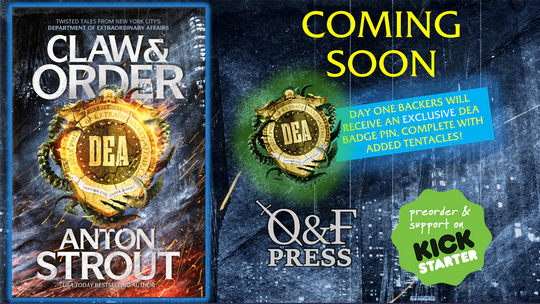
It’s entitled Claw & Order and I had a hell of a lot of fun collecting these tie-in tales I’ve written over the years. From the world of The Spellmason Chronicles and the Simon Canderous urban fantasy series comes a collection of tales from the repository of New York City’s underfunded and mostly secret paranormal protection agency, the Department of Extraordinary Affairs
What makes you and your books unique? Shine for me, you diamond.
Well, it’s my sandbox I’m playing in, so I’m more out of control than ever before, in a sort of mad-with-power kinda way. For over a decade I’ve listened to well intended readers clamor for more adventures from the Simon Canderous quartet and the Spellmason Chronicles. What they might not have known is that I’d also written many short stories set within that shared world, all published among assorted and sometimes hard-to-find anthologies…until NOW. It’s an opportunity to put all the related tales to the series in one sexy looking volume, plus we may see some new tales featuring Simon and Lexi depending on what stretch goals we read. It’s all up to the readers and their support.
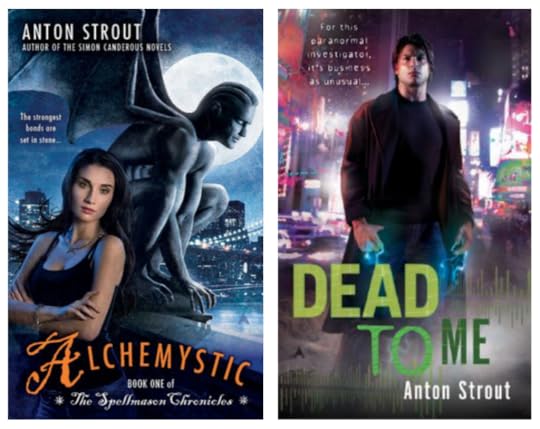
What are you working on now/any future projects you want to talk about?
I’ve got the fulfillment and extra tales to (hopefully) think about for Claw & Order, depending on how it funds by Friday, November 13th. Plus I’m polishing up a game world piece for Dystopia Rising and then there’s a sekrit thing I can’t tell you about yet, but it’s a property I’ve wanted to write for since 1984-ish. I’ve said too much. They’re on to me! Run!
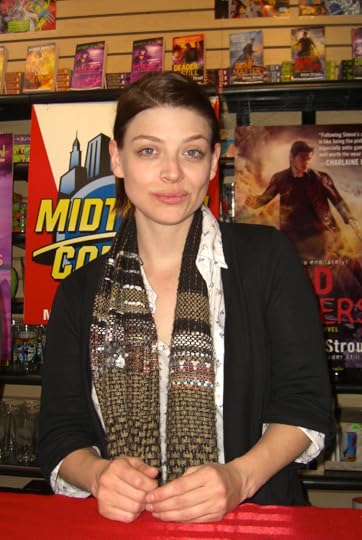
Let’s celebrate. What’s one of the best things that’s happened to you as an author? Don’t be shy.
I became friends with actress/director/writer Amber Benson. Her editor at Ace suggested she read me to get a feel for urban fantasy and we met at New York Comic Con where she thanked me. I was a huge Buffy fan and was (spoiler alert) sad when her character had passed on the show years ago, but she was so sweet and like minded in humor that we became fast friends, thanks to my author life, so that was pretty keen.
Let’s talk CRAFT
What about self-publishing appeals to you? Why did you choose this particular path to publication?
Most of my work has been traditionally published, but I also know from 22+ years dayjobbing in the Big 5 NY publishers that not everything I write fits nearly into their worldview of what’s publishable. And I have very vocal cheerleaders online who want more of Simon Canderous and Lexi Belarus from both my series, so putting together a collection of tales around them and other beloved side characters seemed the way to go. The great thing about Kickstarting a self-pubbed project like this is that you’ll know pretty quick if your project is full steam ahead or not. The proof is in the pitching of the concept. Plus I get to make a lot cool in-world products as rewards…
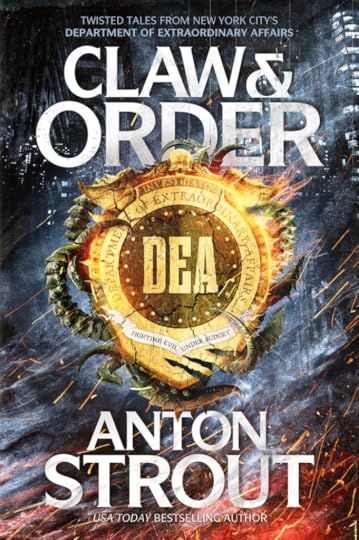
Plotter or pantser, and why?
I’m a minimalist plotter, maximist pantser. I need to keep the book a bit of a surprise to me while I write it. When I’ve been forced to do a formal outline, I get so much down that I have a hard time wanting to flesh it out into the actual book. Because I write multiple series, I DO have to do a bit of planning for long arc ideas vs book to book arc of ideas, and that takes a small bit of plotting. Once I get a first draft down, I’m able to step back, see the whole, and add all the supporting details to it, but I have to let the book surprise me a bit on the way to the end. I like the tease of discovery along the way.
What does your research process look like?
As a general rule (which, yes, I break all the time), I try to restrict my research first time through a book. I keep it on a need-to-know basis. Falling down the rabbit hole is far too tempting and stops me getting words on the page. I’ll often do something like: “Simon grabbed the $$medieval weapon like a Morningstar, research later$$” and keep going. Details, for me, get added in like flavoring an elaborate soup or something. The first draft words are the soup base.
What are some of the most interesting rabbit holes you’ve found yourself lost down?
The most dangerous one I hit is for weapons. In The Spellmason Chronicles, I have a sort of Latina paladin character whose fell in love with polearms. Hard to weild in modern Manhattan, but she makes it work. She favors the glaive-guisarme, but I have lost days of researching many a pole arm, taken field trips to MOMA, gone and played some D&D to try them all out… It can be days before I get back to my writing!
[image error]
Time to talk about BOOKS
Tell me about the most recent book you’ve read.
In all the crazy of the world right now, I’ve had a little trouble focusing on reading fiction. Which sucks, because I’m not reading genre, which I live, nor am I reading the hundred or so books a month I need to focus on for my day job in publishing. Instead, I’ve turned my reading to a little soothing of my anxious mind with The Daily Stoic and Daily Stoic Journal. Ryan Holiday has been applying classical Stoicism to modern day problems, and I find his approach refreshing and it scratches an itch in me to control what I can at the center of the world’s storm. The journal lets me reflect on topics that are discussed in the main book, and as a one-two combo, it’s helping me cope. Launching a Kickstarter just adds to my anxiety in all this, so I need the mental help!
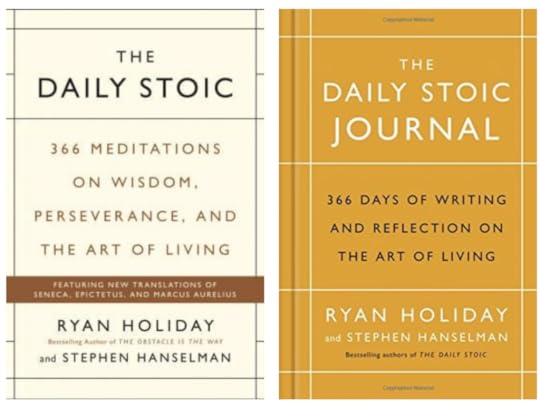
What’s your favorite book as a child?
Around 12 or so I went to this now defunct bookstore in the heart of the Berkshires, October Mountain Books. I picked up a book for a show I caught five minutes of on PBS, right after Doctor Who. It was wacky, science fiction, and had a tone to it that influenced much of my own humor for the rest of my life. That book was The Hitchhiker’s Guide To The Galaxy by Douglas Adams. It’s safe to say I wouldn’t be in the writing business if not for his influence.
Hobbies & All Things Weird
When you aren’t writing, what can you typically be found doing?

Much of the past few years used to find me filling my free time with gaming, but then my wife and I had the brilliant idea to have twins, so that’s pretty damned time consuming. Now that they’re seven, I’ve had more time to write again, but I do have a standing Dungeons & Dragons game on Tuesdays for the past three years to fit in a little gaming.
I am a firm believer that we all have to be a little weird to do what we do. What makes you delightfully wacky?
Well, for years I thought I was mentally deficient or something, because I was either super conversational or else seeing how long I could go without talking to anyone. Sometimes it would be several days of silence. Or I’d see the CEO of my publishing company, just the two of us in a hall, and I’d loudly proclaim “HOWDY!” Howdy, Strout? Really? Note: I am from New England and have no country accent. Why would I do that? Then I learned there was such a thing as an ambivert, a combo intro-and extro-vert. It explained much, and just being able to name something gives you control and power over it in your life. I’m not sure all my interactions were delightful, but they were wacky.
What’s your favorite holiday and why?
I’m a big softie for Christmas, especially with 7-year old twins in the house. I’m ready for that tree to go up right at Thanksgiving, to decorate, to anticipate, to see old friends, to drink, to be merry, and end the year well… and all of it with presents, giving and receiving. I’m pretty classic about it. I think I have some urban fantasy holiday stories I want to explore…

What’s your favorite food from a country you do not live in?
Kobe beef. Like actually from Japan, not the Americanized version, tho it will do in a pinch. I’m not a snob about it. Rare to just barely medium rare.
Any final thoughts?
I read a question somewhere on the interwebs, and I need to know the answer. If the Star Trek replicators are creating food from molecules, and not, say, animals themselves, can vegetarians feel free to order meat from them? I’m sure there’s a Starfleet test called The Impossible Whopper Maru or something that shows a scientific breakdown of it…
Thanks for stopping by, Anton Strout! Please remember to check out his kickstarter, and buy his books.
October 2, 2020
Indie Author Interview | E.M. Hamill

This is part of a new series of interviews featuring indie authors. These interviews will drop once or twice a week. If you’d like to be part of this series, please contact me at Sarah (at) bookwormblues (dot) net. Please support the authors by clicking on the affiliate links in the interview, spread the word, and, of course, buy their books.
We’re all in this together, you know?
About the Author
Elisabeth “E.M.” Hamill is a nurse by day, unabashed geek, chocoholic, sci fi and fantasy novelist by nights, weekends, and whenever she can steal quality time with her laptop. She lives with her family, a dog, and a cat in the wilds of eastern suburban Kansas, where they fend off flying monkey attacks and prep for the zombie apocalypse.
Links
Website
Facebook
Twitter
Goodreads
Let’s get the important stuff out of the way first. How about you tell me about your books.

My very first self published full-length novel was the urban fantasy Nectar and Ambrosia. It’s a snarky look at gods and religion and what former deities are doing now that they aren’t allowed to be worshipped anymore—mainly, they sit around in a bar and bitch about how they used to be somebody. That’s okay for some, but for others, the anonymity is driving them insane and they’ll do anything for attention…even start a war with the current supreme deity and His angels.
My most recent book was with the indie press: Peacemaker, the second book in my Dalí Tamareia Missions. Dalí is a third-gender spy/former ambassador who is on a mission of vengeance to take down the terrorist who killed their family. These are space opera thrillers with sex, drugs, and aliens, a lot grittier than my urban fantasy.
Sarah’s note: I’ve actually just started reading these books and they are ROCKING MY WORLD. Read them. Seriously.
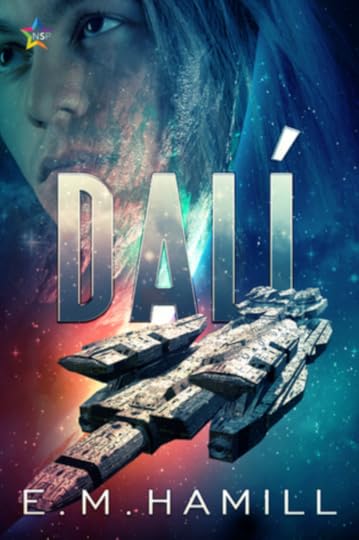
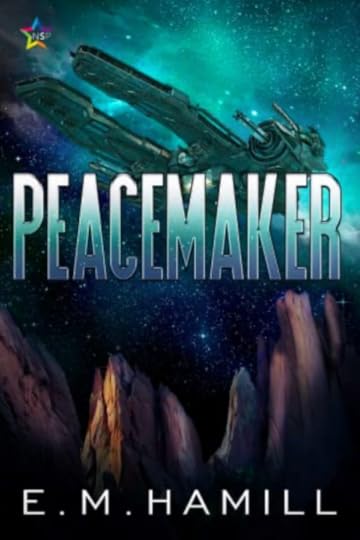
What makes you and your books unique? Shine for me, you diamond.
I try to write inclusively since I am bisexual and genderqueer, and all my books have representation of the LGBTQ community. The snark is strong with me, so no matter how serious the subject, there’s plenty of dark humor and slapstick. Dark slapstick.
What are you working on now/any future projects you want to talk about?
Currently I’m working on the third book in the Dalí Tamareia Missions, Third Front. Once that’s done, my attention is going back to the Amaranthine Inheritance world that spawned Nectar and Ambrosia. Puck has been bugging me about a couple of things I need to get out of my head, and trust me, Puck does not like to be ignored.
Sarah’s note: I *loved* Nectar and Ambrosia. I cannot wait for more in this world.
Let’s celebrate. What’s one of the best things that’s happened to you as an author? Don’t be shy.
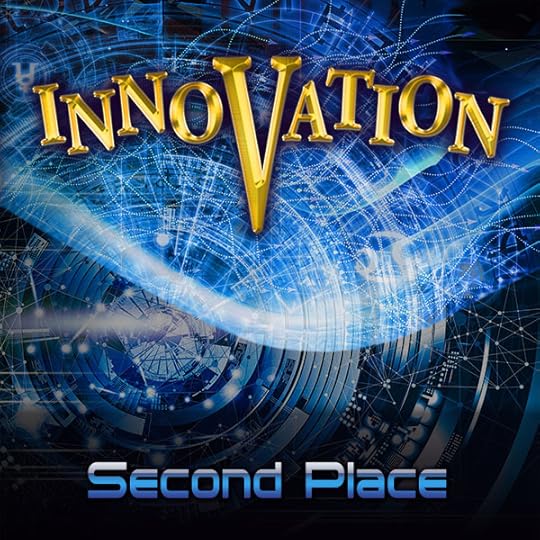
Seriously, the fact total strangers have read my books or listened to the audiobook and liked them just blows me away, and that is the absolute BEST thing ever. Beyond that, my flash fiction “Dragon Slayer” won second place in an annual anthology contest this year, over entries from some personal idols whose books I fangirl all over and who are extremely successful traditional authors. It was a story that meant a lot to me as a cancer survivor and as an oncology nurse. I almost spontaneously combusted from joy that it resonated with the judges. Lastly, it looks like Peacemaker might make the semi-finals in an indie contest sponsored by Publishers Weekly, and that also blows my mind.
Let’s talk CRAFT
What about self-publishing appeals to you? Why did you choose this particular path to publication?
I’ve done both self-publishing and traditional with an indie press. I’m a little bit (okay, a HUGE) control freak and suffer a lot of anxiety in the traditional vein. The entire process makes me want to pull my hair out because except for the writing part, everything’s out of my hands. I love being able to co-design my cover with the artist and have total say in choosing my own publishing timetable, the narrator for an audiobook—everything. I have a professional editor with whom I work who knows how I write but keeps me in line with industry standards. I still would like to be traditionally represented and published some day and have the support and connections which ideally come with that, but in terms of satisfaction, I will continue to self-publish as well.
Tell me about some of your personal writing pitfalls and what you do to avoid them.

The best thing I ever did was purchase an AutoCrit membership. Their software picks out repetitive words, filter words and adverbs, flags areas where your narrative drags—all sorts of cool stuff. It’s become a valuable tool in my arsenal. My characters tend to shrug, sigh, and breathe a lot, so it’s helpful to catch as many of those things as I can before I send things to my betas.
When does research matter, and how do you incorporate it into your books?
Research matters to worldbuilding—not because you’re going to regurgitate it whole, but because you’re going to use it to craft a mood and a place that is as real and believable as possible. For my sci fi series, I’ve researched faster than light travel, genetics, our solar system’s moons and planets, atmospheres, and gravity. I also researched addiction, organized crime, and martial arts. For all that information, I haven’t focused on every detail, only used the information to embellish and create an accurate, dramatic narrative.
Let’s talk about sensitivity readers. Have you ever used them? How do you go about doing it? When and why?
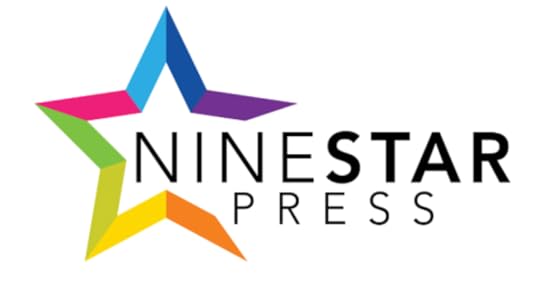
I have used sensitivity readers—the small LGBTQ press I write with employs them on every manuscript, and I am grateful for the privilege of having a fairly diverse group of beta readers. Any time one writes from outside their own experiences as a human being (such as from a trans character’s point of view) or from the viewpoint of a person outside their race or culture, a sensitivity reader must be hired. There are professional sensitivity readers out there who should be paid for their time, and their input and assessment must be respected.
Time to talk about BOOKS

Tell me about the most recent book you’ve read.
The most recent book I read was an ARC of Bloodlaced by Courtney Maguire, kind of an anime-flavored vampiric delight. The imperial Japanese setting and the Youkai were a new take on vampires and supernatural creatures for me. The main character, Asagi, is a gender-fluid individual and I liked her a great deal.
Let’s throw some light on diversity. What are some books you love that feature diverse characters, diverse authors, etc.
I have pretty much fallen in love with everything I’ve read by KJ Charles, who writes historical M/M romance in so many different genres. Her worldbuilding and storytelling skills are just *dies of envy*. My latest obsession of her books are the Will Darling Adventures, set just after WWI in England and they are a blast to read.
S.A. Collins’ Beware Mohawks Bearing Gifts was a very cool romantic fantasy (and the best use of a pun in the title of a fantasy novel) set in an alternate universe where there is a sovereign First People’s Nation on the North American continent rather than what exists now. The prose is very old-fashioned and reminds me of late 19th century pulp novels. The author himself is a gay Native American.
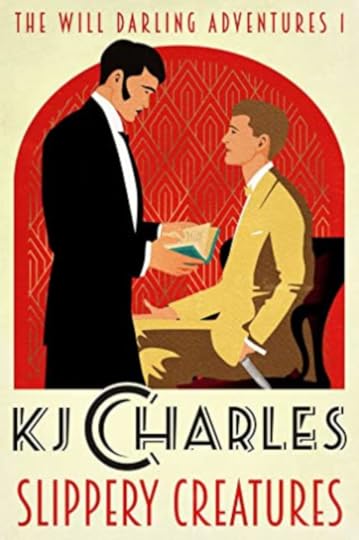
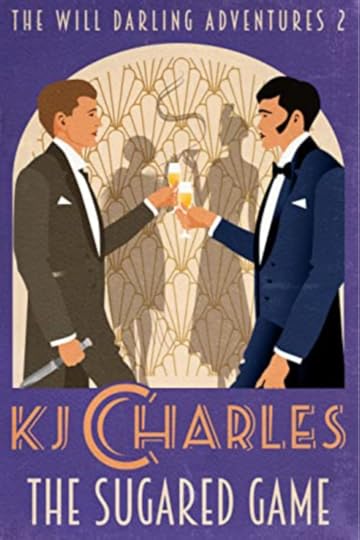
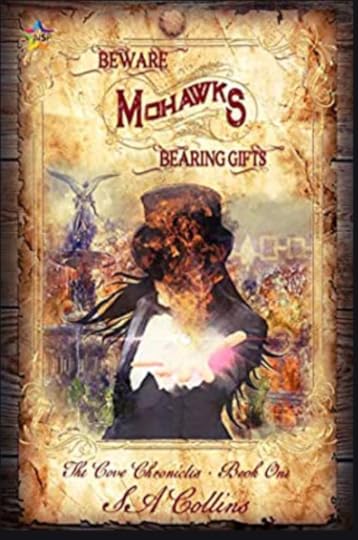
I will freely admit I need to branch out in my author diversity—while I read a great number of books by LGBTQ authors, my list of books by authors of color is woefully small. I’ve read a few of N.K. Jemison’s books. If anyone has any sci-fi or fantasy recommendations by marginalized authors, feel free to send me note via Goodreads or my WordPress page.
Hobbies & All Things Weird
Tell me about something in your life that brings you joy. What is it, and why?
I’ve always loved walking in the woods, especially in autumn when the leaves are drifting all around like bright snow, and the wind rustles the trees. That’s my favorite time of year, but I love tracing the same paths from early spring all the way through the year to watch the change of the seasons. The silence quiets my overactive mind, without distractions and demands and deadlines hanging over me.
 Public domain image found here
Public domain image found hereWhat’s a hobby you had as a child that you no longer do?
As a kid, I collected rocks and minerals. I was really into it for a while, even subscribed to a rock collecting magazine! My parents ended up using a lot of them in their landscaping when I was growing up. I noticed at my mother’s house just a few days ago that she still has the “hamburger rock” I found in the river when I was probably in kindergarten. As I got older, I stopped picking up rocks (though I do sometimes bring home souvenirs, like some ocean-rounded stones I picked up on the beach in Dover, England).
What’s your favorite food from a country you do not live in?
 Image from the article linked in “Daifuku Mochi” text.
Image from the article linked in “Daifuku Mochi” text.Oh my gosh. There are so many. When I went to Japan *mumblemumble* years ago, I discovered daifuku mochi, which are delicious little rice buns full of sweet red bean paste, and dumplings called gyoza. I can eat my weight in gyoza. My Vietnamese classmate’s grandmother used to make us the best spring rolls I’ve ever tasted. My friend’s Filipina mother in law introduced me to the magic that is lumpia and I was instantly hooked. Apparently I am a dumpling addict.
What’s your favorite swear word and why?
Fuck. It has so many uses and variations. It is a verb, a noun, and an adjective all at once. The perfect swear. You can whisper it or scream it and it is completely satisfying.
Any final thoughts?
You’re never too old to follow your dreams.
Thanks for stopping by, E.M. Hamill! Please remember to check out her website, and buy her books.
September 30, 2020
Review | The Silence of the Girls – Pat Barker

About the Book
The ancient city of Troy has withstood a decade under siege of the powerful Greek army, which continues to wage bloody war over a stolen woman: Helen. In the Greek camp, another woman watches and waits for the war’s outcome: Briseis. She was queen of one of Troy’s neighboring kingdoms until Achilles, Greece’s greatest warrior, sacked her city and murdered her husband and brothers. Briseis becomes Achilles’s concubine, a prize of battle, and must adjust quickly in order to survive a radically different life, as one of the many conquered women who serve the Greek army.
When Agamemnon, the brutal political leader of the Greek forces, demands Briseis for himself, she finds herself caught between the two most powerful of the Greeks. Achilles refuses to fight in protest, and the Greeks begin to lose ground to their Trojan opponents. Keenly observant and coolly unflinching about the daily horrors of war, Briseis finds herself in an unprecedented position to observe the two men driving the Greek forces in what will become their final confrontation, deciding the fate, not only of Briseis’s people, but also of the ancient world at large.
Briseis is just one among thousands of women living behind the scenes in this war–the slaves and prostitutes, the nurses, the women who lay out the dead–all of them erased by history. With breathtaking historical detail and luminous prose, Pat Barker brings the teeming world of the Greek camp to vivid life. She offers nuanced, complex portraits of characters and stories familiar from mythology, which, seen from Briseis’s perspective, are rife with newfound revelations. Barker’s latest builds on her decades-long study of war and its impact on individual lives–and it is nothing short of magnificent.
304 pages (kindle)
Published on September 11, 2018
Buy the book
I’ve never really found myself particularly interested in the saga of Troy until I read The Song of Achilles a few years ago. That book ruined me, and I loved it. It’s also one of my favorite books. Something about Madeline Miller just does it for me. However, more than just loving a good story told well, it got me really interested in Troy and Achilles, and the history of that period, which is something I knew nearly nothing about before.
The thing is, if you want to read about a bit of history that is just overflowing with personal and political drama, you can’t really do much better than Troy, Achilles, Patroclus, and Briseis. The war was bloody and horrible, and a really good author can take what is offered and twist it in such a way, so each retelling feels fresh, new, and like a punch right into the solar plexus of the reader’s feels.
“Great Achilles. Brilliant Achilles, shining Achilles, godlike Achilles . . . How the epithets pile up.
We never called him any of those things; we called him ‘the butcher’.”
The Silence of the Girls is a book I’ve heard a whole lot about, but I haven’t really wanted to read it. I’m not sure why, but there was some reluctance there, and now that I’ve read it, I regret not having read it sooner. This book tells the story of Troy, though from the woman’s perspective, through one Briseis, who is taken as Achilles’s concubine.
This is not a book for the faint of heart. There is a lot in here that can turn your stomach and, if certain things like rape and abuse bother you, could easily serve as a trigger. Readers should be aware of that when jumping in. However, I’m a bit morbid, and I found that I appreciated Baker’s unflinching way of looking at the female experience of war. It’s not unique to Troy, rather, it’s something that still happens to this day, and while the author never glorifies it, she doesn’t hide from it either.
I was a slave, and a slave will do anything, anything at all, to stop being a thing and become a person again.
That being said, Briseis is a fantastic narrator with a powerful voice and a strong personality that is instantly the match for anything set against her. While the writing is lyrical, and slips into poetry at times, the beauty of it is matched with the strong will of Briseis herself, and her ability to look every situation in the eye and tell the truth of it. The juxtaposition of beautiful prose and horrific events is something that, as a writer, I try very hard to put in my own books. I really love it, and I love how Barker uses that narrative tool in this book.
Briseis’s power of observation means that a lot of what is happening is laid out, almost studiously, for the reader. She is, at times, both exhausted and infuriated, and yet there is a softer side of her as well. A side full of yearning. Briseis may be the voice, but she tells the story of the whole, and does it incredibly effectively.
The story of Troy is not new. It’s been told for thousands of years, since Homer, and it’s not new in books, either. There’s something about this particular historical drama that draws people to it. Troy can, at times, feel overused, overtold… just over. However, Barker has a knack for retelling a story that could easily feel stale and breathe new life into it. Briseis’s tale of her fall from queen to slave is not a particular aspect of the story I’d ever seen focused on before. That says a lot about how women are often overlooked in history, but it also says a lot for Barker’s ingenuity, her ability to take one of the lesser-touched aspects of the Troy saga, and turn it into a gripping narrative.
“I listened and let it soothe me, that ceaseless ebb and flow, the crash of the breaking waves, the grating sigh of its retreat. It was like lying on the chest of somebody who loves you, somebody you know you can trust—though the sea loves nobody and can never be trusted. I was immediately aware of a new desire, to be part of it, to dissolve into it: the sea that feels nothing and can never be hurt.”
Briseis is weaker than those who hold her captive. She can’t use her physical strength against here enemies, and this is, perhaps, what captivated me about her the most. She has the strength of her voice, of her knowledge, and most importantly, her power of observation is the knife she uses the most. It is through this observation that the entire saga of Troy is spun on its head. Briseis shows what life was like for a woman in her world both before the war, and during everything that came after the war began. Women, often kept indoors, neither seen nor heard, are often overlooked. Their job is to tolerate silently. Her life as a queen is revealed as a different form of captivity from her life as a slave, yet it is still captivity.
Through all of this, the reader is left with a lot of very complex thoughts. Briseis forces us to examine a woman’s role and importance in conflict, in history, and in narrative. She makes us examine the female side of war, which is rarely so unflinchingly told. Briseis shows readers that physical weakness does not mean that a person does not contain strength, and emotions are not the enemy. And while doing this, she often shows these larger than life historical figures, Achilles, Agamemnon and the like in a far different, often surprising, light. Perhaps the most impressive result of all of this is the way Barker turned all of these characters into living, breathing people who exist and became my reality while I was reading.
“How do you separate a tiger’s beauty from its ferocity? Or a cheetah’s elegance from the speed of its attack? Achilles was like that — the beauty and the terror were two sides of a single coin.”
Intermixed in all of this are some bits of story told from Achilles’ point of view. I really enjoyed these parts of the book, because after reading so much of Briseis’s story, it was interesting to get into the head of the man who was such a force and central figure in her world. However, I can also see where readers would find this less than enchanting and might even find these parts of the book a slog to read.
By this point, it’s pretty obvious that I loved this book. I enjoyed the tragedy, the darkness, even the hard parts to read. I also loved the quiet moments of beauty that were sprinkled throughout. Mostly, what I loved were the prose, and how this story was so incredibly human despite all the inhumanity in it. Briseis was a captivating narrator, with an unforgettable voice and an unflinching eye for detail. The Silence of the Girls takes the Trojan War, does something new and unforgettable with it, and I absolutely loved it.
5/5 stars
September 29, 2020
Review | A Wind from the Wilderness – Suzannah Rowntree

About the Book
Hunted by demons. Lost in time.
Welcome to the First Crusade.
Syria, 636: As heretic invaders circle Jerusalem, young Lukas Bessarion vows to defend his people. Instead, disaster strikes.
His family is ripped apart. His allies are slaughtered. And Lukas is hurled across the centuries to a future where his worst nightmares have come true…
Constantinople, 1097: Ayla may be a heretic beggar, but she knows one thing for sure: nine months from now, she will die. Before then, she must avenge her father’s murder–or risk losing her soul.
Desperate to find their way home, Lukas and Ayla join the seven armies marching east to liberate Jerusalem. If Lukas succeeds in his quest, he’ll undo the invasion and change the course of history.
But only if he survives the war.
Only if his enemies from the past don’t catch him.
And only as long as Ayla never finds out who he really is.
422 pages (paperback)
Published on October 29, 2018
Buy the book
I am going to admit right up front, the entire reason I read this book was due to the cover. That cover art is amazing. Something about the colors and the shapes just works for me. So, to sum this particular paragraph up: Anyone who says that covers don’t matter is lying.
Anyway, as soon as I cracked the book and realized this is a historical fantasy, I was hooked. This was the book for me. I love history. Love. It. And any good retelling of some gripping historical period is something that will assuredly put my butt in my chair. What is more gripping than the Crusades? Tragedy, drama, greed, devotion… it’s all there. And reader, it’s all here, in this book, as well.
“We could have reconciled them through love, but we persecuted them through fear. Is it any wonder that they turned to destroy us?”
I write my own style of historical fantasy. Though I set my books in secondary worlds, they are all based on real world history you can research and learn about, and I don’t hide any of that at all. I will say, as one author who writes historically influenced novels, about another, the research process that goes into writing historical fantasy is not something that should be minimized. There’s a lot you have to get right, and a lot that takes a ton of really rigorous hours to learn, not to mention the time spent talking to experts, as well as the google searches, the books read, and the like.
I know first-hand what it’s like, how hard, and how high the payoff is when it is done right. And that payoff, you ask? Well, it’s all in the details. Small things that might not matter to anyone else, but they all work together to make this world the author has created come to vibrant life for the reader. It’s not just knowing the culture and beliefs of the day and age, the rough outline of the important information, if you will. You’ve also got to know what people typically ate, the norms regarding treatment of women, clothing styles, weaving styles, how people spent the day, the push and pull of aspects of life that were in flux, all the way down to the houses people lived in and so much more (so. much. more.). All of this brings the story to life so you, the reader, can feel fully immersed in it.
(Example: I spent two hours researching how houses were typically built in the countryside of Ukraine in the 1920’s and 1930’s for two sentences you’ll eventually read in An Elegy for Hope. People, the amount of random research that goes into writing a book is just surreal. You probably won’t notice them, but I sure will.)
“Power is a two-edged blade, Raymond. Even if one man could command this whole immense army, I’m not convinced that he should.”
Anyway, the entire point of my minor tirade there is to tell you that the research Rowntree did to write this book is not only in depth, but also richly layered into her world and the story she’s written here. Nothing was overlooked. I almost felt like I could smell the air in the cities, and see the food, feel the walls all around me. It was marvelous, and woven into the book so effortlessly, you’d not really notice how much work went into creating something that realistic and dimensional unless you really stop to think about just how the author managed it. Folks, it’s research. It’s tons and tons of research, and an uncanny ability to know when to add details and facts, and when to let readers fill in the blanks. It was incredibly well done all around.
The story in A Wind from the Wilderness is a lot of things: romance, redemption, self-exploration, and growth all set against the turbulent era of the Crusades, when war was prevalent, and men went to war in an effort to save their souls. People suffered, and people loved, and people endured tragedy and triumph. This is a rife, ready period of history to set a book. There’s so much fodder here from which authors can draw from, and I was delighted to see how well Rowntree dealt with this time period, staying true to its immediate and wider conflicts and issues, while bringing to life the very personal, very complex stories that are impacted by all that is going on around them. From two youth who should be enemies, overcoming that which should stand between them, to a knight who is on a quest to reach Jerusalem in an effort to atone for his sins, these stories not just give a human aspect to this larger than life period, but they humanize it as well.
What I really enjoyed about this book was how well Rowntree played these huge, important events against the intimate stories of individuals. It was fascinating to me, how events helped shape people, but also how she showed people influencing events rather than getting lost in them. One stone thrown into a pond might seem small and inconsequential, but the ripples that roll out from it create lasting change. Ultimately, I felt like that was what was happening here. Her characters were stones thrown into this sea of events, causing huge ripples, and yet she never lost sight of them and who they were. She never dropped any of those balls she was juggling.
“The children of earth have grown wise of late, and have driven us out of their temples. But if they can no longer be deceived, they can be corrupted. They will butcher each other for God’s sake, and I will drink and be satisfied.”
There are fantasy elements in this book, in the form of magic and time travel, but I will say I felt like the book more flirted with fantasy rather than leaning into it. This actually ended up being a positive to me. I like books that straddle the line between genres and refused to be pinned down or boxed up. Is this fantasy? Is it historical fiction? Is it both? You decide. Dare to stray from the path, you diamond. There are fantasy elements there, but I felt they were more of a perfume rather than an overwhelming plot device. That isn’t to say you’ll be disappointed if you read this book wanting magic and the like, it does exist, but if you’re a reader who wants a gentler touch with fantastic elements, this might be worth checking out.
The pacing is very measured. Never a dull moment, never a wasted page. The prologue will likely be the one where readers struggle most. You’re thrust into the center of a conflict and conversation without anything to go on. You’ll eventually make sense of it all, but you’ll likely feel a bit lost throughout reading it. The first chapter is easy to sink into. There’s a clear introductory point, and the story flows from there. Likewise, the ending had a very “first book in a series” feel to it. There’s a resolution offered, but just enough of one to keep you going through the next book. I didn’t mind that at all, because I fully intend on reading the first book. However, I figure it should be noted.
I want to talk a bit about Rowntree’s prose. She knew when to lean into the description, and when to back off. Straightforward, with spurts of beauty, The Wind from the Wilderness was incredibly well balanced, not just in plot, characterization, research, and worldbuilding, but also in the prose. Occasionally toeing the line into purple (which didn’t bother me at all because, hello, have you read my books?), she never quite crossed it, though. This balance also served her very well in making the quiet, intimate moments and the larger, louder ones far more atmospheric and meaningful all around. There were a lot of times in the reading of this book where I forgot I was just a passive observer, rather than living the story as it unfolded.
“His mouth twisted into a bitter smile. ‘Family is everything. Right?’
His words brought stinging tears to her eyes. ‘It’s not everything,’ she whispered. ‘It’s not you.’”
All in all, I was pleasantly surprised by how much I loved this book. A delightful mix of engaging and atmospheric, topped off with vivid prose and characters that were a complex mix of layers and flaws, A Wind from the Wilderness was an absolute delight to read in every respect.
Highly recommend.
5/5 stars
September 28, 2020
Indie Author Interview | M.L. Spencer
This is part of a new series of interviews featuring indie authors. These interviews will drop once or twice a week. If you’d like to be part of this series, please contact me at Sarah (at) bookwormblues (dot) net. Please support the authors by clicking on the affiliate links in the interview, spread the word, and, of course, buy their books.
We’re all in this together, you know?
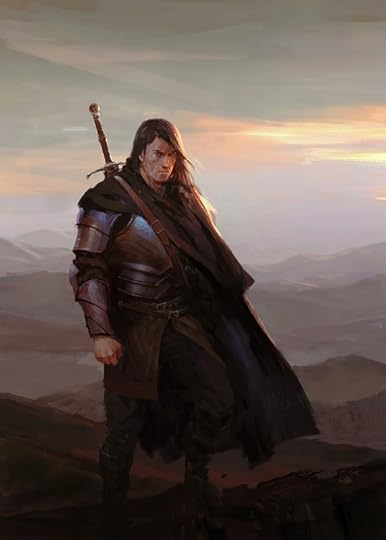
About the Author
M.L. Spencer grew up on the works of Steven R. Donaldson, Stephen King and Frank Herbert. She wrote her first novel-length manuscript at thirteen. Her debut novel Darkmage won the 2012 IndieReader Discovery Award for Fantasy. She was also awarded 1st Place Prose in in the San Bernardino County Writing Celebration.
Ms. Spencer lives in Southern California. By day she works as a biology teacher; by night she sweats over a beaten-up keyboard. She is now in the process of writing a new series set in the same world as The Rhenwars Saga.
Let’s get the important stuff out of the way first. How about you tell me about your books.
Dragon Mage (to be released) is about a boy on the Autism spectrum who is a magical savant. The book is an epic fantasy, so it follows the hero’s journey, but the internal conflict is all about my main character learning to love himself and living life on the spectrum
Sarah’s note: I’m currently editing this book and it is AMAZING.
What makes you and your books unique? Shine for me, you diamond.
Well, a hero on the spectrum is something that I don’t think is done a lot in fantasy. I’ve also got two secondary worlds in one book—one world that is pretty low-fantasy where magic is pretty much extinct and Colonialism reigns. The other world is very high-fantasy with all kinds of magical creatures.
What are you working on now/any future projects you want to talk about?
Writing Book 3 of The Chaos Cycle. I’d also like to expand Dragon Mage into a trilogy.
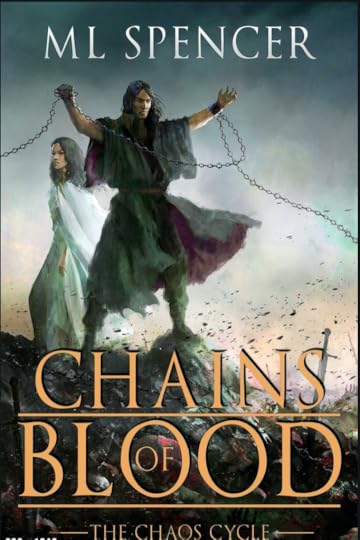
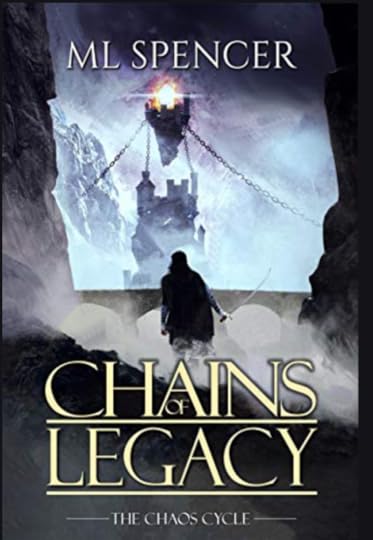
Let’s celebrate. What’s one of the best things that’s happened to you as an author? Don’t be shy.
Three things because I like to brag!
I have sold over 50,000 books yay! And I won the IndieReader Discovery Award for Fantasy. AND I won Silver in Readers’ Favorite.
Sarah’s note: Congratulations!!!
Let’s talk CRAFT
Tell me about something odd you do when you write? Something about your particular process that is distinctly YOU.
I wake up at 4:00am every day to write, except on weekends. I do this because I am freshest in the mornings, and that’s when the words and ideas flow best for me. Also, the house is quiet and I am uninterrupted. I write 3000 words a day doing this.
Plotter or pantser, and why?
I am an obligate plotter. I plot everything from the moment of inception. When I first get an idea I write the “Start” and the “Finish” ideas on a doc and then start filling in from there. Those points in between later become chapter outlines, then those are broken down into scene outlines. The outline for Dragon Mage was, at one point, almost 70 pages long.
Let’s talk about diversity. How do you incorporate realistic diversity into your books? And why is it important to you?
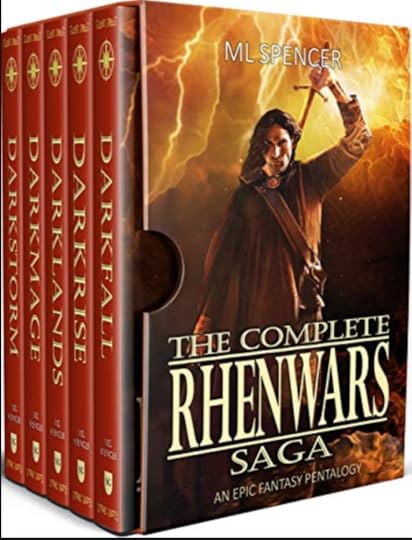
My Rhenwars Saga was pretty much all about otherization leading to genocide of a marginalized culture. It was inspired by the conflict in the Middle East during the occupation of ISIL, which displaced great numbers of people who were, in large part, unwelcome and demonized by the countries who received them. I used a friend of mine, a Palestinian, as a sensitivity reader. She read through the Arabic/Turkish inspired cultures, which made me feel a lot more comfortable.
In Dragon Mage, I’m adding more LGBTQ+ elements to make more readers feel valued and included.
What’s the weirdest thing you’ve researched while writing a book?
I once actually did a web search in which, instead of information, all that was returned was suicide prevention hotline numbers.
What does your research process look like?
I read a LOT of history and anthropology texts. I also am a chronic user of academia.edu and Google Scholar. I have been known to obsessively watch YouTube videos on things like HEMA and blacksmithing.
What research tips or tricks would you give another writer?
1. Wikipedia really is *pretty* trustworthy by now (it didn’t used to be). The best use I get out if it is to scroll down to the references at the bottom of an article to see where they got THEIR information from.
2. NEVER assume. Just because you’ve read it a million times in other books does not make it factually correct.
3. Always make sure your facts are accurate, because if an expert in a certain subject reads your book, and if it’s not up to snuff, they will hate your book.
4. Reddit and Quora are great places to talk to real experts in certain subjects. Never be afraid of asking experts. They usually love to share their ideas and “talk shop.”
Time to talk about BOOKS
What’s your favorite book as a child?

Where the Red Fern Grows. I think it really influenced a lot of what I later enjoyed reading and writing.
Sarah: I’m about 99% sure this book made me cry so hard when I was a kid…
What book(s) or authors have influenced you, and why?
Frank Herbert, Robert Jordan—Sheer epic-ness.
Steven Erikson, Ken Follet—Value of incorporating details
CS Friedman—How to write an antihero.
Peter Flannery—Structure. And how to write characters with a heart.
Hobbies & All Things Weird
When you aren’t writing, what can you typically be found doing?
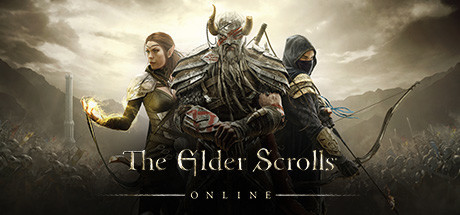
I love playing MMORPGs. Right now I am play Elder Scrolls Online.
I am a firm believer that we all have to be a little weird to do what we do. What makes you delightfully wacky?
I’m on the Autism spectrum, which makes me plenty “weird” in the eyes of some people. It has been a source of a lot of pain in my life, especially dealing with social rejection. It is also my greatest strength, as it allows me to apply myself to tasks with the kind of obsessive focus a lot of people would have a hard time matching. But I do have my little quirks. If you want to read all about them, pick up Dragon Mage
What’s something you want to learn how to do? Why?
I want to learn to speak Arabic. I really learned to appreciate it because of my religion and because of all the research I’ve done on Middle Eastern cultures. It is a beautiful language that is much more elegant and descriptive than English.
What’s your strangest talent? (Example, I can pick literally anything up off the floor with my toes. It’s awesome.)
I am also pedidextrous. AND I can make my eyes roll in opposite directions.
Sarah’s note: Reader, I had no freaking idea there was a term for people who could pick stuff up with their toes. Day = made.
What’s your favorite food from a country you do not live in?
ALL OF THEM. Seriously, American food pretty much sucks compared to the rest of the world. Especially Indian food. It’s all about Vindaloo. And Daal. And Korma…ack!
We all have family recipes. Share one of your favorite ones.
 Image mined from Google, and this website.
Image mined from Google, and this website.
My Truly Amazing Yellow Curry:
(I’ve been told by many people it’s better than most restaurants!
It’s also the only thing I can cook that doesn’t taste like crap!)
Chicken dark meat, cut into up postage-stamp sized pieces
2 cans coconut milk
1 can coconut cream
1 green bell pepper, cut up into strips.
1 potato, cooked, peeled and cut into large pieces.
1 large yellow onion, cut up in whatever way you like.
A couple of pinches of cilantro, minced
McCormick curry powder.
3 cups jasmine rice
3 tbsp fish sauce
peanut oil.
In ginormous wok, heat up to high.
Make the rice while cooking the curry. (steam it)
Heat a couple of tbsp of peanut oil. Brown chicken until just done on outside only. Remove from heat. Add a bit more oil. Cook veggies except for cilantro until crisp-tender. Remove from heat. Turn wok to med. Add fish sauce and stir for about 20-30 seconds. Don’t let the smell drive you away! Hang in there! It’s delicious, really! Add all the coconut milk/cream. Add curry powder, little by little, until the mixture is a rich golden color. Add the chicken and veggies. Cook on Med/low for about 10-15 min. Do not let it boil. The last 5 min add the potato. Add cilantro right before serving.
Serve with rice.
Spice it up with red pepper or chili garlic sauce.
Sarah’s note: Holy crap, I am *so* cooking this.
Any final thoughts?
Dear Writer: Never EVER give up!!!
Thanks for stopping by, M.L. Spencer! Please remember to check out her website, and buy her books.
September 25, 2020
Indie Author Interview | Aaron Cross
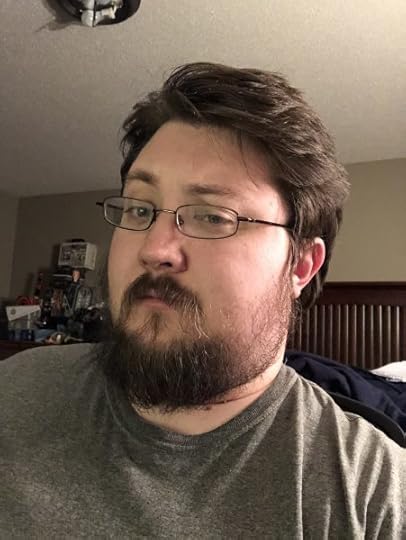
About the Author
According to family lore, Aaron learned how to read (or knew, actually) at the ripe age of two years old and proceeded to devour – figuratively, of course – every book he could get his hands on like a literary toddler-aged Galactus. He continued to read and expanded his reach to writing when he was in middle school, creating a piece of work that makes him physically upset any time he reads it. Seriously, the ‘working’ title is This Will Never See The Light of Day and that is the point.
Thankfully, he grew out of it and now writes reasonable-quality work that seeks to entertain, with his first book, Robocopter Ski Patrol, blending Doctor Who-style time manipulation with Archer-style humor and moderate to severe vulgarity at times, his second book, Untitled Spy Story: A Novel, creating a world where roundhouse-kicking the Secretary of State on top of the White House after a mescal-fueled dance sequence is possible, and his third book, Ruben’s Cube Alaska: Bullet Point 2: Judgment Day: This Time It’s Real, bringing into the world a possibly-immortal Russian with a pet dire wolf, a search for an artifact that could change the nature of time itself, and a hero who isn’t sure what’s real anymore. Aaron is now a full-fledged PhD so now he has the skills to pay the (ever-increasing) bills…one would assume, is very much single (ladies), and has a Moleskine filled with ideas and concepts for dozens of new books. Video games, the Internet, and a good appreciation of fine beer completes him.
Links Galore!
Amazon
Twitter
Website
Goodreads
Facebook (Facebook even though they broke the formatting again, the hacks)
I am always willing to chat, talk shop, or answer questions!
Let’s get the important stuff out of the way first. How about you tell me about your book.
Depends on which one you’re talking about! For the first three, they’re comedic fantasy (in the broadest of terms) and are send-ups/satires of some of the most basic action movie tropes – the getting the crew together, the one last job, the shadowy conspiracy, all of that. They’re packed full of references and jokes and doesn’t let up until it gets serious.
Other than those, I have a weird Western out for editing right now (which still doesn’t have a damn title) that is kind of like Red Dead Redemption 2 if Arthur Morgan was more violent, sweary, and the world was populated with corrosive gray dust and gold-blooded demon corpses.
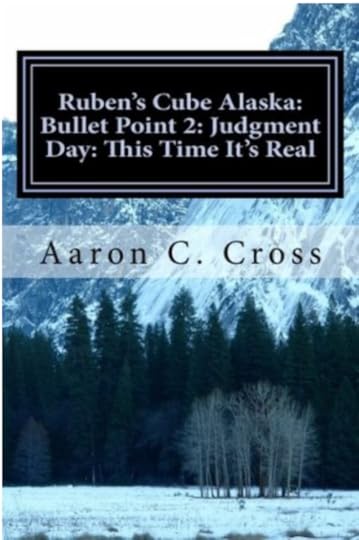
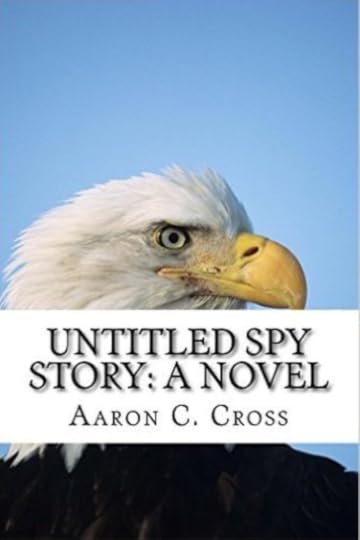
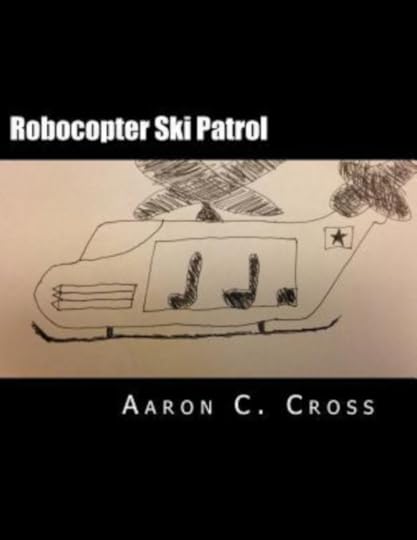
What makes you and your books unique? Shine for me, you diamond.
For the comedies, they’re unique because I refused to put any reins on them. One of the hard and fast rules I had for myself while writing them is that if I couldn’t come up with a strong, legitimate reason to not do something, it went in. That’s what gets you three doses of that stupid jaguar, though, so blessings and curses.
For the Western, it’s unique because there is so much of the world and setting that I choose to leave unexplained. Not in a way that takes the reader out of the story, but in a way that shows the world is lived in and populated in a way that doesn’t connect to the story. The larger world is its own thing and is allowed to be its own thing. That’s been fun to write and discover as I go.
What are you working on now/any future projects you want to talk about?
Currently, I’m writing away at the sequel to the Weird Western in the same universe. This one is a sort of reimagining of the twelve labors of Hercules by a bounty hunter looking to redeem himself. I’m having a lot of fun with the world and there are at least two or three sequels to this current one in the queue already. That’s not even talking about the couple dozen books in the Roboverse I need to get back to once I start feeling like I can be funny again.
Let’s celebrate. What’s one of the best things that’s happened to you as an author? Don’t be shy.
Honestly, that feeling I got the first time I finished writing a book. That sense of accomplishment and actually completing something was mind-blowing. I was so proud of it. Still am, in fact. Besides that, I’d say being introduced via a mutual friend to Jonathan French, who has been supportive and a great source of guidance in my early career and also helped me connect with the broader fantasy community. I never would have found the people I have without his help and introduction to the field.
Time to talk CRAFT!
Plotter or pantser, and why?
I’m almost completely a pantser. I do generally start out books with mapping out characters and broad plot points, but even those are changed as I go along. The way I kind of see writing, and it’ll sound weird, is not so much that I’m creating what is being written. Instead, it’s almost like transcribing what’s happening or being said. Since that’s the case, the control I have over my characters and even the main plot or sub-plots is minimal. If I try to lock characters in to one way of doing things, they will find a way to break it. They always do. Bastards.
Do you listen to music when you write? What kind?
Absolutely. I find that music helps me block out the outside world and the oppressive quietness since I write late at night. What kind of music, though, differs night by night! Some nights it’s hard, driving metal music, some nights it’s going straight 80s pop, and some nights it’s even just a weird blend of styles from Billy Joel to Caravan Palace. My writing soundtracks would be nightmarish for anyone who wants any kind of order to them.
What are some of the most interesting rabbit holes you’ve found yourself lost down?
Actually, for my current WIP (a new one that is not currently being looked at by my fantastic editor), I’ve gone down a huge rabbit hole of Greek mythology. Not just basics, but specific details, specific locations, what the location names and person names mean, and how best to translate those names into a Wild West setting without them sounding forced. It’s taken me from Wikipedia all the way to deep dives into ‘behind the name’ websites. It’s either going to work really well or go down in a spectacular conflagration.
Tell me about an unexpected thing you’ve learned, and how you’ve worked it into your book.

That would probably be this particular quote from my third book:
“Calling what happened merely ‘good luck’ would be like calling an Annie Wilkes impromptu talocrural re-adjustment ‘slightly painful’ or a Damian Hirst modern art installation ‘a bit pricey’.”
There are about three or four references there that I 100% looked up simply to make jokes. That quote is immediately followed by one of my ‘editor’ characters insulting me as a writer for going too obscure with the references. It’s…a weird book.
Let’s talk BOOKS!
Tell me about an underappreciated book, and why everyone should read it.
I’ve got two choices here. First, I’m going to go super unknown here because why not? It’s a series called Mesopotamia//Tiamat by a lady named Ashley Wrigley. It’s this futuristic cyberpunk-ish series that has all these different factions scuffling over this broken planet. It’s incredibly engrossing and one I wish that more people could hear about (plus I know what it’s like to be beyond obscure so giving that love forward can’t hurt my author karma).
The other choice is the Autumn’s Fall series by Jonathan French. Before he went all SPFBO-winning badass with The Grey Bastards, he wrote a couple of other fantasy books involving shapeshifters, living constructs, and rooster knights. Yeah. They’re really good as well.
Sarah: I tried to get these two images below to be smaller in size but this new WordPress makes me want to light things on fire, so they are still huge. I decided my mental health was more important. Apologies.
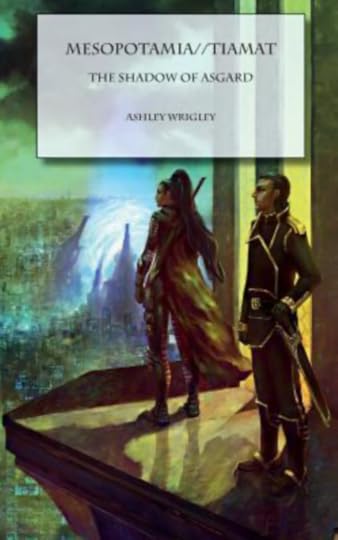
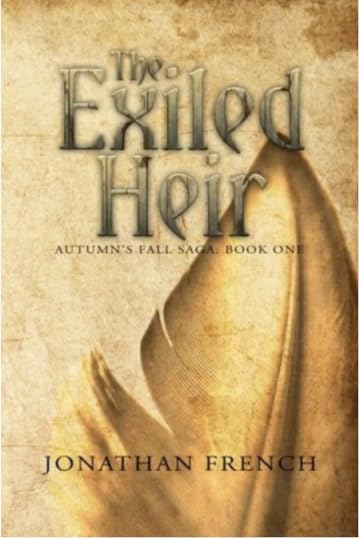
What book would you like to see turned into a movie, and who should play the leading roles?

Selfishly, I’d love to see my second book (Untitled Spy Story: A Novel) turned into a movie. It’s ridiculous and funny and just turns the fourth wall into shards. Ryan Reynolds as Will Texas, Elizabeth Debicki as Paisley Canada, and maybe Jason Isaacs as Secretary of State Vincenzo Matterhorn would be amazing to see on-screen, plus they would have to get Lou Bega to do a cameo because he’s such an important part of the book. That’s not hyperbole.
Hobbies & All Things Weird
I am a firm believer that we all have to be a little weird to do what we do. What makes you delightfully wacky?
I don’t have a ton of reverence for many typically ‘scary’ situations. Every time I’ve been to the hospital, I try to/do make the nurses and doctors laugh, despite the fact that I’m in pain or dying (damn appendix). When I tore both my triceps (damn LA Fitness), I made the guy trying to find a vein for blood have to leave the room because he was laughing so hard that he was scared he may miss and hit something important. The same goes for public speaking. Even if I’m nervous, I do what I can to make light of it and get people laughing. Screw spiders, though. They have no sense of humor.
What’s your strangest talent?
I have the ability to identify a very large number of songs just by their opening chord or by a random note or word in the middle of the song. I’ve driven people crazy in restaurants by interrupting a conversation to point out that the song being played – and muffled by loud people – is King of Wishful Thinking by Go West or Keep Pushin’ by REO Speedwagon or something. It only applies to songs before the early 2000s though. Anything after around 2004 is a complete crapshoot. I’m an old man, musically.
If you had to pick a superpower, what would you pick and why?
I love this one because it’s not a typical choice but is so useful. I’d pick the ability to refill whatever I want. Think about it. Bank account low? Refill it. Wallet empty? Refill it. Scotch or wine bottle empty? Refill. Medication or cleaning supplies or gas tank or fridge wiped out? Refill. Toilet paper roll empty? Re. Freaking. Fill. Instead of having to worry that you may run out of anything, you’d have the peace of mind that it’s all just a snap of the fingers away.
What’s your favorite food from a country you do not live in?
When I was in Prague with my brother a couple summers ago, I got rabbit kidneys at this restaurant and it was almost a transcendent experience. I doubt I will ever have them again but, for that meal, I was floating.
Tell me a strange, random fact.
“Buffalo buffalo Buffalo buffalo buffalo buffalo Buffalo buffalo” is a grammatically correct sentence. It essentially means “that bison who are intimidated or bullied by bison are themselves intimidating or bullying bison (at least in the city of Buffalo)”. I love when English breaks itself.
Sarah’s personal note: Holy shit, reader, I verified this to be true. Mind = blown.
What’s your favorite swear word and why?
Well, I’m a big fan of the usage of ‘fuck’ in any context that requires it, but I really have to admit I love the word ‘cunt’. It’s so obscene – especially in the US – and so vicious and the sound just lands. The hard kuh sound with the finish of the tuh hits twice and packs in power with it. I mean, Malcolm Tucker in The Thick of It and In the Loop or Bricktop in Snatch? It’s so weighty. Love it.
Any final thoughts?
Things are broken right now in a ton of different ways. My hope as an author is that what I write – funny or not – allows whoever is reading it to set aside the world outside and just dive into something that helps them relax. There is the need for people to read things that say something meaningful, but there is also the need for people to read about feral velociraptors or drunk-on-mescal dance sequences or near-immortal Russian men with direwolves. There is room for all of it and I hope that people read my things and enjoy themselves.
Check out Aaron’s website and buy his books !
September 24, 2020
Announcement | Indie Interviews
Hello internet!
I have recently come to a few conclusions.
I want to help promote indie authors. I edit for indie authors. I am an indie author. I know how hard it is to be heard when you’re indie. I don’t think I have a whole lot of power regarding influence, but what small amount I do have, I want to use well. I want to put good things into the world. The world is a steaming pile of garbage. I can’t do a whole lot to change that, but I can make this dusty corner of the internet a haven for the things I love and believe in.
As you may or may not have noticed, I’ve been working hard to highlight indie books, and support indie authors recently by posting reviews and trying to spread the word about indie books. However, I don’t have a whole lot of time (Seriously. I edit books full time. I write books. I have two kids who are distance learning, and like… life.), and I want to do something more. Something a bit more personal, but I have to strike a balance between having zero free time, and my desire to do something I really, really feel strongly about.
I came up with an idea a while ago to interview indie authors and feature the interviews once a week on my website. I finally got around to tinkering with an interview format, and I think I’ve got some pretty good questions, and a good way to go about it, so I’m announcing Indie Author Interviews! (I will also occasionally have traditionally published authors interviewed, but this is mostly for the indie SFF scene.)
I have a pretty high demand for these interviews so far, so while my goal is to have one interview drop every Friday, for a while you might see them on Mondays and Fridays both.
My goal, as I’ve said, is to make my website a place that promotes the incredible diversity and lush talent in the indie genre scene. It’s such a vibrant, wonderful corner of the bookverse and I’m honored to be part of it, but I do know how exhausting it is to try to be heard. I believe in treating people the way I’d like to be treated. As an author, I’d like some time to shine, a stage on which I can speak my piece, and someone to genuinely pay attention to what I am producing.
So that’s what I’m going to offer you.
My first Indie Author Interview will drop tomorrow. If you’d like to be featured, or you have a book coming out sometime soon (I’m thinking late October/early November might be the earliest I can nail an interview date down right now) then please let me know. My email is Sarah (at) bookwormblues (dot) net (no spam, please, and for the love of God don’t sign me up to your mailing lists). I’m compiling a list of authors who want to be interviewed. I’ll add your name to the list, and send you the interview questions within two weeks or more of the date you request. First come, first served.
If you’re a person who just loves author interviews, and you want to learn about indie authors and indie books, then make sure to stay tuned.
Review | Sixteen Ways to Defend a Walled City – K.J. Parker

About the Book
A siege is approaching, and the City has little time left to prepare. The people have no food and no weapons, and the enemy has sworn to slaughter them all.
Their only chance rests with a colonel of engineers – a despised outsider, a genius, a master of military and political strategy with the wrong color skin. He is the City’s only hope.
But nobody, rich or poor, wants to take orders from a jumped-up Milkface. Saving the City from itself might be more difficult than surviving the coming siege.
386 pages
Published on April 9, 2019
Buy the book
This book was sent by the publisher in exchange for an honest review.
“…as a wise man once said, the difference between luck and a wheelbarrow is, luck doesn’t work if you push it.”
I have put off reading this book. I didn’t want to do it. The reason isn’t what you probably expect. You see, K.J. Parker is my favorite author, and I always have issues when reading his books, because I don’t want them to end. The best way to keep a book from ending? Don’t start it.
My logic is flawless.
Anyway, I decided enough was enough. It was time for me to get a move on and read this book already.
I personally think Parker’s strong suit as an author are his shorter works. His novellas never cease to amaze me, but I also love his novels. Sixteen Ways to Defend a Walled City is a novel in every respect, and I honestly think it’s probably one of his best published works to date. Everything I love about Parker is evident in this book, from his understated sarcasm, to his unique world, complex moral dilemmas, and that delightful gray area he loves to play around in so much.
Sixteen Ways to Defend a Walled City is told via first person perspective by one Orhan. Orhan is an incredibly unreliable narrator, which Parker seems to excel at creating. In this sort of Byzantine-feeling world, the Robur people are the dominant ones, and Orhan basically is an outsider, the only “barbarian” or “milkface” of moderate rank in the Imperial army. This interesting tension between his Robur overlords and Orhan himself is very prominent throughout the book, and cleverly played upon. Orhan’s wit and sarcasm really serve him well, making him a rather caustic figure but also impossible to look away from.
“Of the people, by the people, for the people. I can’t remember offhand where that quote comes from; it was something to do with some bunch of wild-eyed idealists overthrowing the tyrant so they could become tyrants themselves. No good will have come of it, you can be sure. The people; God help us.”
Orhan is an engineer, and through a series of really bad events, he has to figure out how to defend a city from an unknown invading enemy that is mercilessly laying waste to basically whatever they set their sights on. Calling upon all of his talent and wit, he makes all sorts of interesting contraptions to keep the city defensible. He does some pretty horrible things throughout the book which might make any reader who isn’t familiar with Parker balk, but it’s all part of who Orhan is, and part of Parker’s style. This whole thing where people do horrible things in the name of whatever is not new to this book. It’s sort of a forte of Parker’s, and I like to think it’s part of how he dabbles with issues of morality as he writes.
As I’ve said above, Orhan is an unreliable narrator, and there are a few reasons for this. First, he is unashamedly out for himself. Whatever furthers him and his goals is just fine by him. He has no qualms with doing horrible things if they end up working toward his own desired end. Secondly, his public image is incredibly important to him, so he often tells stories through the lens of someone trying to sell his image to others. Think of him as a used car salesman. He’s both the salesman and the car in that particular scenario. While I tend to struggle with unreliable narrators, it’s mostly due to the writing of them. I think writing a really good unreliable narrator is extremely difficult, and Parker basically gives a masterclass on how to write one in this book.
“The way I see it, the truth is just barren moorland, all useless bog and heather. It’s only when you break it up and turn it over with the ploughshare of the Good Lie that you can screw a livelihood out of it. Isn’t that what humans do? They take a dead landscape and reshape it into what they need, and want, and can use. I’ve never hesitated to adapt the world to suit me, when I can get away with it.”
With all of Parker’s books, I tend to read them with one eye focused on the story, and the other eye focused on whatever he’s not saying. For example, there are parts of this book which distinctly reminded me of some current day, real world events. There are some parts that made me examine said events in a bit of a different light. Parker has a way with evening out the playing field, while caustically throwing shade at certain people/events/issues, and I really love that about him. His books work on multiple levels, and readers who enjoy trying to puzzle out cues and inferring things will probably really enjoy this one. There’s a lot here, from a story that’s just absolutely captivating and impossible to put down, to all those delightful layers that Parker works so well.
Sixteen Ways to Defend a Walled City is set in a sort of Byzantine-ish empire which, as it happens, is the perfect place to set a siege. There isn’t a whole lot of worldbuilding here, but there doesn’t need to be. I think this book is more of a human story, set against a cityscape backdrop, steeped in empire. It’s more important that the people and ideas shine than the nuances of the larger world.
Parker knows what he’s talking about with all things military. Quite frankly, a lot of the details blew my mind. They were interesting and so intricate. Nothing is overlooked; no stone left unturned. While I’m not really a person who enjoys long, drawn out battles, that’s basically what this book is, and I ended up loving it. Partly because I was just fascinated by all these details, all this information that he so carefully inserted into his narrative, but also because, throughout the book, he’s sprinkled in these bits of wisdom and insight that just astounded me. So perfectly worded, with the ability to strike right to my soul and cut to the quick of any particular scene. This book tells a story, but it also, in some really unique Parker-esque way, shines a light onto conflict and the human condition. I didn’t really expect the marriage of all those elements to work as well as they did, but boy howdy, Parker really got all the cogs in this machine to work flawlessly.
“Being, in my own small way, a part of Authority, it never ceases to amaze me how much people believe in it and trust it. I see it from the inside, of course—inefficiencies, stupidities, corruption, bloody-minded ignorance and simple lack of resources to cope with the magnitude of the endless, ever-multiplying problems. But other people see it from the outside. They see the Land Walls. They see the emperor’s head on the coins, with Victory on the reverse. They see the temples. They see soldiers in shining armour. They see, and they believe, that the empire is big, strong, wise, unbeatable.”
The book was almost over as soon as I started reading it because it was impossible to put down. From the plot, to the prose, everything is *chef’s kiss*. Really, however, it was Orhan’s voice that was the icing on this particular cake. He’s one of the most unique narrators that I’ve come across in a while, with an unforgettable story to tell. He paints everything that happens in a cynical light, and still, I just couldn’t look away. He’s so incredibly, unashamedly human, and Parker shows all of him to his readers: the good, the bad, and the ugly.
Sixteen Ways to Defend a Walled City is one of the best books I’ve read this year. I’m sorry it took me so long to get to it, but I didn’t want it to end, so I decided it’s better to just not start it. Now, there’s another book out following this one and I’m halfway thinking I might turn a hundred before I get myself to read it. Parker is an author whose books I savor. I sip them slowly, and enjoy every word, every character, every nuance. I let them settle into my sinew and make a home in my bones. Sixteen Ways to Defend a Walled City is amongst his best work.
5/5 stars
September 23, 2020
Review | A Ritual of Bone (The Dead Sagas, #1) – Lee C. Conley

About the Book
“Only valour and steel can stand against the rising dead”
Arnar is a land of warriors, its people as stalwart as the stones themselves. In a land of dark forests and ancient hill forts, a forgotten evil is awoken by curious minds.
The Great Histories and the Sagas say nothing of this evil, long passed from the memory of even the studious scholars of the College. For centuries, the scholars of Arnar have kept these records and preserved the knowledge and great deeds of a proud people. The story of these peoples forever chronicled in the Sagas of the Great Histories.
But now the evil spreads and the dead walk in its wake, terrible creatures roam the night and even the spirits are restless. The Dead Sagas could perhaps be the final chapters of these great records.
Many threads entwine to tell this Saga, interweaving the tales of those who played their part in the search for answers and ultimately their fight for survival. Amid plague, invasion and terror, the inexorable rise of the dead sends a kingdom scrabbling to its knees.
This Dark Fantasy Epic combines dark malign horror and gritty survival adventure as the Dead Sagas unfold in a world where honour and renown is all, where beasts and savages lurk in the wilderness, and where sword, axe and shield is all that stands between the living and the grasping hands of the dead.
384 pages (paperback)
June 17, 2019
Buy the book
This book was provided by the author in exchange for an honest review.
Lee C. Conley is a new author to me. However, I was in the mood for something a bit darker, a bit horror, with an atmosphere to give me the creeps but not make me feel like I was reading Stephen King or something, and here we are.
A Ritual of Bone is an interesting story that follows a few different characters. It doesn’t become clear how they all intersect until near the end, which I really enjoyed. While this book does follow distinct storylines, there’s a certain unity in them, in the world building, and the activities taking place so while I didn’t always know how they were related, I was confident I would eventually figure it out. I enjoyed this atypical narration. It not only served the book quite well, but it also gave the readers a layered, textured world to immerse themselves in. I’ve said in a lot of my recent reviews that I read a lot, and it seems like these days the authors who dodge the norm and go their own way are the ones I’m paying attention to, and Conley does that quite well.
The worldbuilding really needs some time to shine. One other thing you’ll know if you’ve read my reviews for any length of time is that it almost takes an act of God for me to read a book that involves zombies and/or boats. I don’t know why, but those two things almost never work for me. A Ritual of Bone does not involve boats, but it does involve zombies. I wasn’t aware of that at first, and when I got my first hint of the creatures, I was all, “Oh, I’m going to hate this.” However, I will say it really worked for me. Likely, this is largely due to the unique world, and Conley’s deft hand at creation and his skill with balance.
‘They test us…because here dwell men who will fight, and we should be honoured that they have chosen us–perhaps the finest warriors of Arnar–as their champions. Old Night will be denied my spirit this night.’
You see, this book is an interesting mix of western-esque fantasy and horror, never too much of one or the other. I think one reason zombies annoy me so much is they are usually leaned on so hard they become parodies of themselves, and almost so unrealistic they are laughable. Conley seems to know when to hold back and when to really lean into his world and the beasties that inhabit it. This creates a really good balance, not just between all these different elements, but also between the fantasy and horror aspects of the book. It required a lot of detailed thinking on the part of the author, and a lot of planning, and he pulled this interesting marriage off nearly flawlessly.
There is blood and violence in these books. I mean, what book featuring cannibalism and zombies wouldn’t have blood and violence? Like most other aspects of the book, however, I never felt like Conley glorified in the blood, or made more of it than what there should be in any particular scene. This is grimdark, and things are really dark and grim, but he knows when to lean in and go full throttle and when to pull back and let the details and graphics be inferred rather than in your face. I should also note, Conley has nailed the creeping sense of dread that is a requirement in all horror novels. It was there, and it was spectacular.
The characters were also this interesting mixed bag for me, where, like with zombies, I expected to really dislike them, but I ended up really liking them. On the one hand, you’ve got Master Logan and his apprentice, who are toying around with some arcane magic that has long been forgotten. It’s very easy for what they are doing to have long lasting, and dire consequences. And, like humans everywhere, they do it anyway. I will freely admit that the master/apprentice storyline isn’t one I typically enjoy. However, Conley knew what he was doing. Much like the zombies, he took something I expected to hate, and wrote it in such a way where I ended up enjoying it quite a bit.
Perhaps it was easier to forget, to fall deeper into the darkness, to leave guilt and grief behind.
On the other hand, we have Bjorn. Bjorn was really the storyline that kept me rooted in place the most. He’s a hunter, escaped from one horrible situation and finding himself in another, even worse one. He’s tough as nails, and keeps the book going forward at an almost relentless pace despite everything set against him. He felt, to me, perhaps a bit more mature than the apprentice, and he was more in the world, and seeing this darkness for himself. Mixed into this are other stories as well, like a captain trying to keep his crew members safe as his soldiers are picked off by a mysterious illness. And then there’s Nym, who is doing absolutely anything in an effort to survive in a terrible place.
As you can probably guess, there is a whole lot of darkness in this book, and not a ton of light. I am not just speaking of the plot and outside factors, but human nature itself, as examined in this book, is not a thing full of butterflies and rainbows. From the master and his apprentice who are basically hellbent on toying with this seriously dangerous magic, everyone be damned, to the hunter stuck in this abysmal situation, to a mysterious illness, to Nym, who has to sell her body to survive, you really span a lot of the worst parts of the human experience. I tend to really enjoy this kind of thing, but I know a lot of readers don’t. They want a little light to balance out all the dark, and you should know what in the pool before you dive.
So, as you can see, I really did enjoy this book immensely.
My one issue is (and I feel horrible saying this) regarding editing. Look, I’m a full-time editor. I have been doing this for years. The result is that I have a really hard time turning this part of my brain off. However, I did feel like this book could have used a bit more editing, specifically line editing. There were repeated words in some paragraphs, and some clunky phrasing, and points where I think this detail had already been covered. Small things that likely the average reader wouldn’t notice, but this is my job, and this is how I put bread on my table, so I notice, and I wouldn’t be writing a good review if I wasn’t honest, so there it is.
At the end of the day, this book had a whole host of things in it that I thought I’d hate but ended up loving, and the reason for that is because Conley has this skill with knowing how to balance all the elements of his story. Without that, I honestly think I would have bounced off this book. However, A Ritual of Bone was one of those weird ones that seems to defy all odds and tell a story that I ended up extremely invested in. It is the darkest kind of grimdark, but it’s unique marriage of epic fantasy and horror, and the multi-layered story being told made this one impossible to put down.
4/5 stars
September 17, 2020
Review | Lady Romeo: The Radical and Revolutionary Life of Charlotte Cushman, America’s First Celebrity – Tana Wojczuk

About the Book
From the very beginning, she was a radical. At age nineteen, Charlotte Cushman, America’s beloved actress and the country’s first true celebrity, left her life—and countless suitors—behind to make it as a Shakespearean actress. After revolutionizing the role of Lady Macbeth in front of many adoring fans, she went on the road, performing in cities across a dividing America and building her fame. She was everywhere. And yet, her name has faded in the shadows of history.
Now, for the first time in decades, Cushman’s story comes to full and brilliant life in this definitive, exhilarating, and enlightening biography of the 19th-century icon. With rarely seen letters, Wojczuk reconstructs the formative years of Cushman’s life, set against the excitement and drama of New York City in the 1800s, featuring a cast of luminaries and revolutionaries that changed the cultural landscape of America forever.
A vivid portrait of an astonishing and uniquely American life, Lady Romeo reveals one of the most remarkable women in United States history, and restores her to the center stage where she belongs.
288 pages (kindle)
Published on June 9, 2020
Buy the book
I came across this book purely by chance, and since I read it, I’ve sat here wondering just how on earth I planned to write a review about it. And married to that thought, is why don’t more people know about Charlotte Cushman?
I’ve been on a bit of a “women in history” nonfiction bender recently. The more obscure and overlooked, the better, because let’s be real here for a moment. If you want to plumb the depths of forgotten important historical figures, the vast majority of the ones you’ll find are women.
Enter Charlotte Cushman.
I bet you’ve never heard of her. I bet she’s a woman whose name has never crossed your path. That’s how it was for me, and since I’ve read this book, I’ve been a bit obsessed.
 Charlotte Cushman as Meg Merrilees (via Wikipedia)
Charlotte Cushman as Meg Merrilees (via Wikipedia)Now, before I get into the details of Cushman’s life and what, exactly, this biography is about, I want to take a moment to tell you how accessible this book really was. Some biographies are hard to get into, because they read more like a textbook than the story of someone’s life. This one, however, is grounded. There is a lot of fact here, and a lot of information given to the reader, but Tana Wojczuk never derails herself from the easily accessible manner in which she started the book. The story is broken up into short, rather punchy chapters which keeps the reader from ever feeling bogged down. I never felt like I was reading a textbook. I never felt like I was being buried alive under mountains of information. What Wojczuk really excels at, is telling a purely human story, in a very human fashion.
Charlotte Cushman is a fascinating historical figure that has been largely forgotten and really shouldn’t have been. Having been one of America’s very first celebrities, she was wildly popular in her day and age. Alive in the 1800s, she lived through a lot of this nation’s earliest growing pains, and not only suffered loss and tragedy (personally and politically), but was thrust into the national spotlight at an early age and thrived there. The title of the book, Lady Romeo, is applicable for many reasons, but I think the primary one is due to the fact that Cushman was one of the first actors to bring Shakespeare to life for American audiences.
“For Charlotte, a character was not only learned but grasped at once in a flash of intuition. Then she would distill the character through repetition. Charlotte’s Meg was so popular the show was extended. When her stockings wore out, Charlotte mended them rather than buy new ones, to keep up the appearance of age and poverty. When her costume needed to be replaced, she dyed the new one by hand, rubbing it with dirt and other mixtures she invented herself to age it. She continued to do her makeup and hair as she had done that first night: a river of lines and age spots.”
One of the many interesting things about Cushman’s life, was how she grew on stage, but also along with this fledgling nation she was part of. She became an adult in the public eye. She weathered a lot of storms that assaulted the early United States of America, and she did it all while standing in the spotlight. It was fascinating, how Wojczuk managed to tell the story of Cushman as set against the dynamic and changing backdrop of a nation that is just learning how to be a nation. She met some incredible people, too. For example, in her role as an actress, she was introduced to Abraham Lincoln.
And lest you believe she was some small-fry celebrity, she wasn’t. There were crowds of people who would follow her around, mob her, make life hard. She was always on stage in public, even when she wasn’t on stage. Her private life was carefully protected, but never fully private either. She was also known internationally and spent time in Europe enjoying the adulation there. She was a Very Big Deal.
One thing that I really love about history is how nothing is new, and sometimes you run across a book that highlights that fact. Charlotte Cushman was a lesbian, and openly lived with her lovers, and considered herself married. Charlotte and her wife went on tour together, traveled together, braved mobs of fans together, and while it’s not surprising that gay people existed in the early 1800’s, what did surprise me was how open and unapologetic she was about it. When I think of LGBTQ+ people in the early 1800’s, I generally assume they would have had to be pretty quiet about it, and that just wasn’t how it played out for Cushman at all. She was very much a, “this is who I am, take it or leave it” kind of woman.
 Charlotte Chushman and Matilda Hayes, from Wikipedia.
Charlotte Chushman and Matilda Hayes, from Wikipedia.And this isn’t to say that Cushman’s romantic life was ever easy. There were ups and downs, but she was a very pragmatic, forward-thinking woman who, in a lot of ways, used her status and influence to fight for women’s rights, and equality, and I daresay being so open and unashamed about her sexuality likely did a world of good for others around her who were likewise part of the LGBT+ community.
“Charlotte’s legacy is present, though invisible, in every-one of these performances. She was the first to prove that an American could interpret Shakespeare onstage. She resurrected the original text of Romeo and Juliet, and her interpretations of many of Shakespeare’s characters survive today. She inspired generations of women to wear the breeches, on- and offstage.”
This is also, perhaps, the one part of the book that I wished to see more of. The author never goes much into detail about Cushman’s love life or her relationships, and there’s precious little examination of the broader LGBT+ community during her time. While I can see the reasons for this: Cushman is far more than a lesbian, and she should be examined as such, I really did want more about her relationships, about her place in the world and her struggles in a time where stuff like this just was not done (and if it was, it was kept quiet). That being said, Cushman was very powerful in her time, and influenced and empowered many other women with her unabashed resolution to ditch the dress and wear pants (gasp) and her fight for equality both on and off the stage, and so much more.
And yes, the author does cover some of her worries. For example, Wojczuk does touch on the fact that Cushman worried, especially early in her career, about what would happen if the populous found out she was married to a woman. Furthermore, Americans seemed to be more conservative and prone to making a big deal out of her relationships and her prevalence for wearing pants than those in Europe. However, I think I still wanted more.
It did make this book feel a little off-balance. Wojczuk is best when she’s detailing Cushman’s life on stage, her acting, and her time in front of people, in any respect. However, her personal life, her inner thoughts, and the people around her all seemed to pale a bit in comparison, and that’s really where I would have enjoyed more information. Not just about the LGBT+ and women’s rights, but just life in general. Cushman often felt like a person when she was onstage, but not so much in private, and that’s unfortunate. It resulted in a bit of an unbalanced feel, and some disconcerting time jumps where we skip ahead a few years in her life with not a whole lot of explanation of what happened in those intervening years.
So, what does this leave us with?
Despite the fact that Lady Romeo did feel a little off-balance, and I ultimately wanted more information, this book was impossible to put down. Charlotte Cushman was a powerhouse in her day and age, a woman who was unashamedly exactly who she was. She blazed a trail that many still, unknowingly, follow today. Her influence has resonated through the centuries, and still, somehow, she was forgotten. It is unfortunate that so many powerful, incredible women get lost in the shuffle of time. It is a blessing that Wojczuk is bringing her to life here. Charlotte’s story is one that needs to be told, and her influence should be recognized.
4/5 stars



